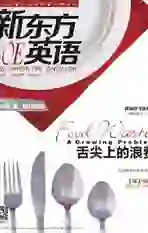外祖母的食谱:爱的味道
2016-07-06ByDavidFerguson
By+David+Ferguson
如今,随着生活节奏加快,经济条件变好,我们在外就餐的时候越来越多。每当我们走进一家餐馆,心里都或多或少地期待能品尝到符合自己口味和心意的美食,但结果却很可能令人失望。直到有一天,当我们回到家中,夹起外婆做的简单可口的饭菜,我们才终于意识到:无论哪里的珍馐佳肴,都不如外婆做的那一碗爱的味道。
Times are a little tough at our house right now. Neither one of us makes a lot of money, but years of experience have taught us how to walk between the raindrops and make it from one month to the next with a fair amount of grace.
I cook a lot at home, more when were facing lean times. When I know that I have to keep us fed on not much money, I fall back on my grandmothers recipes.
She taught me to cook. When I was a kid, my twin brother and I spent long summer weeks and Christmas vacations with my mothers parents, a rural mail-carrier and a textile mill worker in the mountains of north-west North Carolina.
I didnt care much for quail1) hunting or fishing for bass2) and rainbow trout3) like my brother and grandfather. Guns were loud and terrifying, fields were gross and full of mud. Also, little David just wasnt great at killing things. I shuddered when pushing worms on to fishhooks, cried quietly when stuffing bloody limp birds into the game sack.
Turned out, though, that I was really good at baking cakes. So rather than go shiver on frozen mornings in a deer blind4) praying I wouldnt have to pull the trigger on this shotgun, I found myself more and more in the kitchen with my grandmother, watching her soft, arthritis5)-bent hands drizzling corn starch6) into the filling for a lemon chess pie.
“The more you pay, the worse you eat,” she would say. Grandmother had a near-total disdain for restaurants, particularly expensive ones. I told her once that Id been to a “soul food7)” restaurant in New York City where they charged six dollars for a serving of collard greens8) and she was aghast.
“Somebody needs to tell those people that they can pick their own collards for free on the side of the road!” she said, disgusted. And its true. Collards are a weed, but theyre a weed thats packed with iron, calcium and other nutrients, so my dirt-poor ancestors learned how to cook them and make them taste delicious.
My great-grandmother died when my grandmother—the oldest of nine—was 11 years old. As the eldest daughter, she was expected to take on all of the child-rearing duties, grocery shopping (such as it was in the 1930s), cleaning and cooking. She did all of this while attending school and then working full time. I have her high school graduation certificate, which she signed in perfect rounded copperplate9) script on 6 June 1936.
Throughout the Great Depression and the privations10) of the Second World War, she learned how to make a little food go a long way. Vegetables were cheap, so she cooked a lot of them, mostly only using small amounts of meat for seasoning. Roast beef was a twice-a-month luxury, but there was nothing she couldnt do with a chicken, every part of it. Nothing went to waste.
I remember once when I was little, I went to scrape11) some leftover food off my plate and into the trash and she stopped my hand.
“We dont never, ever throw food away in this house,” she said, pointing at the pot of scraps kept each day for my grandfathers two bird dogs, Dixie and Sport. “Never, ever. If youre not going to eat it, give it to the dogs.”
Now I understand that for her food was sacred. The love she felt for us was just as much an ingredient as the flour, salt and pepper breading her fried chicken or the candied pecans12) on top of her baked sweet potatoes. Once food had passed through her hands, it was sanctified by love.
I feel connected to my grandmother and to her mother and to hundreds of years of family and regional history when Im in my kitchen making country food. In the delicious smells and the intoxicating13) blends of flavors on flavors is a long tale of victory over hard times, of conquering starvation—of not just surviving, but flourishing and finding joy and pleasure in every meal of every day.
A big pot of pinto beans14) are, as Steinbeck15) said, “a roof over your stomach. Beans are a warm cloak against economic cold.” Add rice and a steaming hunk16) of buttermilk cornbread and its a nourishing, satisfying meal. Add slices of home-grown tomato and its heaven on a plate. Total cost to feed four people: under $10.
From my mother and grandmother I learned to take real satisfaction in feeding people. My grandmother would beam with pleasure over a heavily laden table and say: “Do you know what this would cost at the cafe?”
I never knew what cafe in particular she had in mind, but I knew that the question was totally not fair, because no restaurant anywhere can cook like a grandmother.
But now, thanks to her guidance and years of practice, I can.
1. quail [kwe?l] n. 鹌鹑
2. bass [b?s] n. 鲈鱼
3. rainbow trout:虹鳟鱼
4. blind [bla?nd] n.〈美〉(狩猎时的)埋伏处
5. arthritis [ɑ?(r)?θra?t?s] n. 关节炎
6. starch [stɑ?(r)t?] n. 淀粉
7. soul food:灵魂料理,美国黑人的传统菜肴,以煎炸为主。
8. collard greens:羽衣甘蓝
9. copperplate [?k?p?(r)?ple?t] n. 工整的圆形西文手写体
10. privation [pra??ve??(?)n] n. 匮乏;贫困
11. scrape [skre?p] vt. 刮掉
12. pecan [?pi?k?n] n. 美洲山核桃
13. intoxicating [?n?t?ks??ke?t??] adj. 令人陶醉的
14. pinto bean:产于美国西南部用作食品或饲料的菜豆
15. Steinbeck:即约翰·斯坦贝克(John Steinbeck, 1902~1968),美国小说家,代表作为《愤怒的葡萄》(The Grapes of Wrath)。
16. hunk [h??k] n. 大块,大片
我们家这阵子日子有点难过。我俩赚的钱都不多,但多年的生活经验教会了我们如何熬过困难时期,比较体面地过日子。
我经常在家做饭,日子一紧巴,做得就更多了。我知道全家就指望不多的那点钱填饱肚子,于是外祖母的食谱在我这儿又派上了用场。
是外祖母教会了我做饭。小时候,每到悠长的夏日或是圣诞节假期,我和我的双胞胎兄弟都会去外祖父母家。他们住在北卡罗来纳州西北部的山区,外祖父是乡村邮递员,外祖母是纺织厂工人。
我不像我兄弟和外祖父那样喜欢打鹌鹑或是钓鲈鱼、虹鳟鱼。枪声太响,又吓人,地里全是泥,感觉很恶心。而且,我小时候就不是那种擅长宰杀动物的人。那会儿,往鱼钩上穿虫子都能让我打哆嗦,当我把鲜血淋漓、软不拉几的鸟塞进猎物袋时,我会默默地哭泣。
不过,我后来发现自己特别擅长烘焙。所以,冰冷的清晨我不再待在猎鹿的埋伏处一边冻得瑟瑟发抖,一边祈祷着不要让我扣猎枪的扳机。我发现自己和外祖母待在厨房的次数越来越多,看着她因患关节炎而有点弯曲的手轻柔地将玉米淀粉撒到做柠檬切斯派的馅中。
外祖母会说:“花钱越多,吃得越差。” 对于餐馆,尤其是那种价格昂贵的餐馆,外祖母的态度几乎是完全的不屑。曾经有一次,我跟她说我去过纽约的一家“灵魂料理”餐厅,那里的一份羽衣甘蓝就要六美元。她听了目瞪口呆。
“得有人告诉那些人,他们不花钱就能在路边摘到羽衣甘蓝!”她愤愤不平地说道。她说的没错。羽衣甘蓝就是一种草,但是这种草富含铁、钙以及其他多种营养物质,所以我那些穷得叮当响的祖辈们才学会了怎么烹饪羽衣甘蓝,而且还做得很美味。
我曾外祖母去世时,外祖母只有11岁。作为家中九个孩子里的老大,外祖母理所当然就要承担照顾弟弟妹妹的全部职责,还要负责买食品杂货(而且还是在20世纪30年代的大萧条时期)、打扫卫生和做饭。她一边做着这些事情,一边上学。后来又一边做全职工作,一边照顾家里。我还保存有她高中的毕业证书,上面有她的签名,是工整的圆形手写体,日期是1936年6月6日。
大萧条以及二战期间物资匮乏的时候,外祖母学会了怎样让少量的食物够吃很长时间。蔬菜便宜,她便多做蔬菜,通常只用一点点肉来提味。烤牛肉是奢侈品,一个月才能吃两顿。但外祖母能用鸡做出各种美味,鸡身上所有的部位都能用上,通通不会浪费。
我还记得小时候有一次我要把盘子里没吃完的食物扒拉进垃圾桶,外祖母阻止了我。
“在咱们家,绝对不能把食物丢掉,”她边说边指着外祖父的两条猎鸟犬迪克西和斯波特的食盆,“绝对不能丢掉。你要是不打算吃了,可以给狗吃。”
现在我才明白,对外祖母来说,食物是神圣的。她对我们的爱就像撒在炸鸡上的面粉、盐和胡椒,或是她撒在烤红薯上的糖霜山核桃一样,是一种原料。食物一经她的手,便被爱神圣化了。
每当我在厨房准备家乡风味的食物时,我就会感觉自己跟外祖母、曾外祖母,跟数百年来家族和当地的历史联系在了一起。各种美妙的香味和各种令人陶醉的味道搭配在一起,其中蕴含着一部长长的胜利史,一部战胜困难时期、战胜饥饿的历史——不仅要活下来,还要把日子过得蒸蒸日上,要在每天的每顿饭中找到幸福和快乐。
正像斯坦贝克说的那样,一大锅菜豆就“能为你的胃遮风挡雨。豆子是抵御经济严寒的温暖斗篷”。加上米饭和一大块热气腾腾的酪乳玉米面包,这就是一顿营养丰富的美味佳肴。再配上几片自家种的西红柿,这就是一顿瑶池盛宴。这样一顿饭能喂饱四口人,总共花费不到十美元。
从妈妈和外祖母那儿,我学会了怎样从做饭中得到真正的满足。外祖母会眉开眼笑地望着一大桌丰盛的美食说:“你们可知道,这一桌要是在饭店得花多少钱吗?”
我从来不知道她说的具体是怎样的饭店,但是我知道这么问一点儿也不公平,因为无论什么地方的饭店都做不出外祖母做的味道。
但是现在,多亏外祖母的
